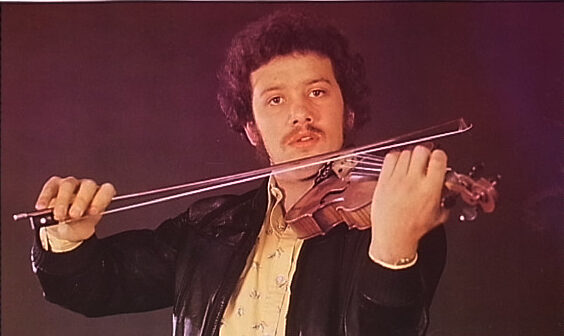Titi Winterstein, born in Breisgau, Germany in 1956, had a remarkable musical journey influenced by his father Tokeli and uncle who survived the horrors of Auschwitz and Buchenwald during World War II. At just 8 years old, Titi began learning the violin from his father and made his first stage appearance at the age of 9 during a gypsy pilgrimage celebration in Illingen, Saarland. By the age of 12, he amazed the audience by playing swing standards of Schnuckenack Reinhardt, capturing the attention of the renowned violinist.
In 1972, Titi Winterstein’s talent caught the attention of Häns’che Weiss, leading to his inclusion in the newly formed string quintet. The press hailed Titi as a child prodigy, and the quintet garnered widespread acclaim. Alongside Häns’che Weiss on violin and solo guitar, the group included Holzmanno and Ziroli Winterstein on guitar accompaniment, and Hojok Merstein on double bass, who also managed the group. The quintet released five albums, touring extensively throughout Europe, including memorable performances alongside Stéphane Grappelli’s trio, resulting in exhilarating jam sessions between the two violinists.
Following the quintet’s success, Titi Winterstein established The Titi Winterstein Quintett officially on May 14, 1978, at the “Festival der Jugend” in Dortmund. The group welcomed pianist Silvano Lagrène and embarked on a documentary project called “Saitenstrassen,” showcasing the musicians and their families during their summer travels. Titi Winterstein’s collaboration with harpist Lee Reed resulted in his first LP, and a second documentary was filmed at the Darmstadt Festival in 1979. The band’s third album, “Djinee To Kowa Ziro,” was recorded in 1985, featuring new members Klaus Bruder on accordion, Peter Gropp on bass, and Reinhardt Geisel on guitar.
The Titi Winterstein Quintett actively advocated for the rights of Gypsies and Roma, participating in various movements defending human rights. They recorded the beautiful album “Live mit Vanessa & Sorba Merstein” in 1987, featuring musicians from Poland who brought Roma songs from Eastern Europe. The quintet’s accomplishments continued with appearances in the TV series “Tatort” and the “World Festival 89” in Atlanta, Georgia, USA. In 1993, Titi performed with Yehudi Menuhin in Brussels, and his participation in a documentary on the Gypsy and Jewish communities further showcased his cultural contributions. The album “Maro Djipen Rehear” in 1994 highlighted Titi’s collaboration with pianist Silvano Lagrène.
Titi Winterstein’s musical legacy lives on through his extensive discography, including the notable compilation “Starportrait” released in 1999. Although he passed away on June 14, 2008, his contributions to Gypsy jazz and his tireless advocacy for human rights continue to inspire and resonate with audiences worldwide.
